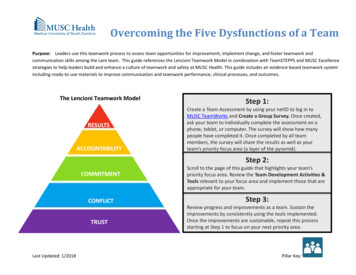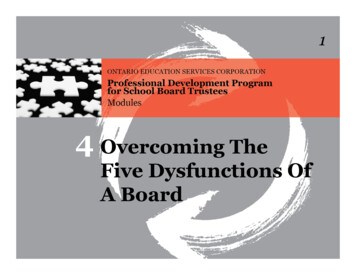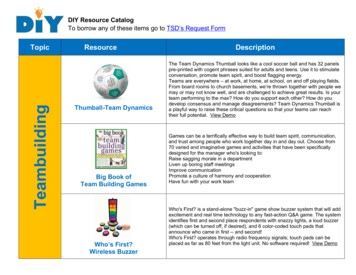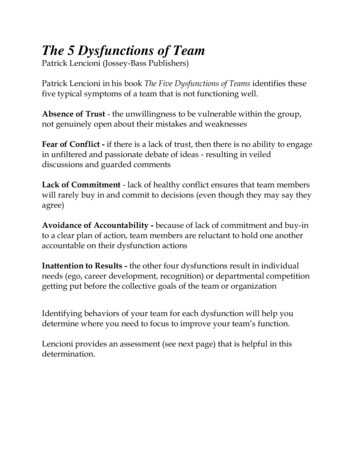
Transcription
Overcoming the Five Dysfunctions of a TeamPurpose: Leaders use this teamwork process to assess team opportunities for improvement, implement change, and foster teamwork andcommunication skills among the care team. This guide references the Lencioni Teamwork Model in combination with TeamSTEPPS and MUSC Excellencestrategies to help leaders build and enhance a culture of teamwork and safety at MUSC Health. This guide includes an evidence-based teamwork systemincluding ready-to-use materials to improve communication and teamwork performance, clinical processes, and outcomes.The Lencioni Teamwork ModelRESULTSACCOUNTABILITYStep 1:Create a Team Assessment by using your netID to log in toMUSC TeamWorks and Create a Group Survey. Once created,ask your team to individually complete the assessment on aphone, tablet, or computer. The survey will show how manypeople have completed it. Once completed by all teammembers, the survey will share the results as well as yourteam’s priority focus area (a layer of the pyramid).Step 2:COMMITMENTCONFLICTTRUSTLast Updated: 1/2018Scroll to the page of this guide that highlights your team’spriority focus area. Review the Team Development Activities &Tools relevant to your focus area and implement those that areappropriate for your team.Step 3:Review progress and improvements as a team. Sustain theimprovements by consistently using the tools implemented.Once the improvements are sustainable, repeat this processstarting at Step 1 to focus on your next priority area.Pillar Key:
Overcoming Absence of TrustTeam TheoryThis occurs when team members are reluctant to be vulnerablewith one another and are unwilling to admit their mistakes,weaknesses, or needs for help. Without a certain comfort levelamong team members, a foundation of trust is impossible.RESULTSMUSC Excellence PrinciplesConcern for the Health Care TeamACCOUNTABILITYTeam Development Activities & Tools COMMITMENTCONFLICT TRUST Last Updated: 1/2018Start with a Team Assessment (TeamWorks/Lencioni) tolay the foundation for team discussion.Hold regular Briefs, Huddles and Debriefs (TeamSTEPPS& MUSC Excellence) to foster face-to-facecommunication.Round (MUSC Excellence) regularly on individual teammembers.Conduct a Personal Histories Exercise (Lencioni) orutilize a Behavioral Profiling Instrument (Myers-Briggs,DISC or StrengthsFinders) to foster understanding.Encourage team members to use CUS (TeamSTEPPS) as away to speak up when they have a concern.Talk about Trust Builder and Trust Breaker (DDI)behaviors.Pillar Key:
Overcoming Fear of ConflictTeam TheoryTeams that are lacking on trust are incapable of engaging in unfiltered,passionate debate about key issues, causing situations where team conflictcan easily turn into veiled discussions and back channel comments. In a worksetting where team members do not openly air their opinions, inferiordecisions are the results.RESULTSMUSC Excellence PrinciplesACCOUNTABILITYTeam Development Activities & ToolsSwift and Just Problem Resolution COMMITMENT CONFLICT TRUST Last Updated: 1/2018Uphold team members to the Standards of Professional Behavior (MUSCExcellence).Hold regular Briefs, Huddles, and Debriefs (TeamSTEPPS) and regularlyRound (MUSC Excellence) to early identify possible conflicts before theyescalate.Use a Conflict Profiling Instrument (Thomas-Kilmann) to betterunderstand how individuals approach conflict.Examine the severity and frequency of team conflict by use the DepthFrequency Conflict Model (Lencioni)Establish a set of ground rules, called Conflict Norming (Lencioni), aroundhow the team will engage in conflict.Encourage members to speak up using CUS (TeamSTEPPS).Identify Conflict Resolution Obstacles (Lencioni) that are regulardistractions that impede conflict resolution.Use Service Excellence (MUSC Excellence) to strengthen relationshipsnegatively impacted by conflict.Use SBAR (TeamSTEPPS) for communication, especially in urgent andstressful situations, to ensure accurate communication.Pillar Key:
Overcoming Lack of CommitmentTeam TheoryWithout conflict, it is difficult for team members to commit to decisions, creatingan environment where ambiguity prevails. Lack of direction and commitment canmake employees, particularly star employees, disgruntled.MUSC Excellence PrinciplesActive and Involved LeadershipEmotional Connection to Patients and FamiliesRobust, Proactive CommunicationRecognize and Reward the BestRESULTSACCOUNTABILITYTeam Development Activities & Tools COMMITMENT CONFLICT TRUST Last Updated: 1/2018Connect your team’s work to the Mission and Vision of MUSC Health and thepatients/families we serve.Hold Briefs, Huddles, and Debriefs (TeamSTEPPS) and Round (MUSCExcellence) to talk about individual and shared goals.If your team is a department, engage in developing a shared Mission & Visionor Organizational Principles (Lencioni).If your team is a committee or task group, prepare a team Charter or set ofTeam Principles (Lencioni).Share and agree on individual and team Goals (LEAP).Recognize (MUSC Excellence) those who demonstrate outstandingcommitment to shared goals.Encourage people to speak up with CUS (TeamSTEPPS) when commitmentseems in jeopardy.Utilize Agendas and produce Minutes (IMPROVE) for team meetings.Before ending meetings, make sure there is no ambiguity about agreementswith Commitment Clarification (Lencioni)Decide at team meetings, how to Cascade Communication (Lencioni orIMPROVE) to other teams and individuals.Pillar Key:
Overcoming Avoidance of AccountabilityTeam TheoryWhen teams don’t commit to a clear plan of action, even the most focusedand driven individuals hesitate to call their peers on actions and behaviorsthat may seem counterproductive to the overall good of the team.MUSC Excellence PrinciplesPersonal AccountabilityRobust, Proactive CommunicationReward and Recognize the BestFocus on Care TransitionsRESULTSACCOUNTABILITYTeam Development Activities & Tools COMMITMENT CONFLICT TRUST Last Updated: 1/2018Hold Briefs, Huddles, and Debriefs (TeamSTEPPS) and Round (MUSCExcellence) to discuss progress, identify accountability issues, andrecognize successes.Embed Just Culture into your team’s standard practices and utilize toensure individual and team accountability.Utilize PSI to identify current and potential problems to cultivate a justculture and learning organization.Encourage CUS (TeamSTEPPS) as a way to speak up to hold othersaccountable.Utilize structured Handoffs (TeamSTEPPS) to ensure the safe transfer ofaccountability from one person/team to another.Recognize (MUSC Excellence) and celebrate the contributions ofindividuals and the team.Use STAR (DDI) or conduct a Team Effectiveness Exercise (Lencioni) toprovide feedback to individuals and the team.Pillar Key:
Overcoming Inattention to ResultsTeam TheoryRESULTSTeam members naturally tend to put their own needs (ego,career development, recognition, etc.) ahead of the collectivegoals of the team when individuals aren’t held accountable. If ateam has lost sight of the need for achievement, the businessultimately suffers.MUSC Excellence PrinciplesACCOUNTABILITYCOMMITMENTCONFLICTHighly ReliableEvidence-Based Practice DictatesTeam Development Activities & Tools TRUST Last Updated: 1/2018Use visual displays of results, such as Scorecards, totrack individual and team results.Utilize Briefs, Huddles, and Debriefs (TeamSTEPPS &MUSC Excellence) to discuss team results.Round (MUSC Excellence) regularly to identify potentialobstacles to achieving results.Recognize (MUSC Excellence) and celebrate individualand team accomplishments.Use Data to identify opportunities for continuedimprovement and growth.Pillar Key:
Additional Teamwork ResourcesLencioni Team Model is a teamwork model describing the Five Dysfunctions of a TeamWorks Catalog in MyQuestBook: Overcoming the Five Dysfunctions of a Team byPatrick Lencioni (contact Tracie Porter to borrow acopy from Quality & Safety)TeamSTEPPS is a teamwork system designed by AHRQ and the Department of AHRQ TeamSTEPPSContact Patient Safety if you want your team to STEPPup and participate in TeamSTEPPS at MUSCMUSC Organizational Excellence is responsible for creating and implementing a MUSC Excellence Essentials (Tools and Guides)MUSC Core PrinciplesIMPROVE (Performance Improvement)MyQuest is MUSC’s online coaching and teaching platform. TeamWorks CatalogLeaderQuest CatalogDiscovery Journals on Teamwork (practices, thoughts,and experiences from MUSC leaders as well asadditional resources)Discovery Journal – TeamworkDiscovery Journal – Leading Teams through ConflictSupport is available to those seeking additional information or assistance by emailing Patrick MacConnell (Hospital)Catherine Flanagan (Ambulatory)Team including strategies to identify and improve each dysfunction to help leaderscreate sustainable, functional, and cohesive teams.Defense's Patient Safety Program to help healthcare professionals improvecommunication, teamwork, and patient safety.performance framework that facilitates transparency, collaboration, and a culture ofcontinuous improvement.the contact listed for your area.Last Updated: 1/2018 Pillar Key:
is a teamwork model describing the Five Dysfunctions of a Team including strategies to identify and improve each dysfunction to help leaders create sustainable, functional, and cohesive teams. TeamWorks Catalog in MyQuest Book: Overcoming the Five Dysfunctions of a Team by Patrick Lencioni (contact










